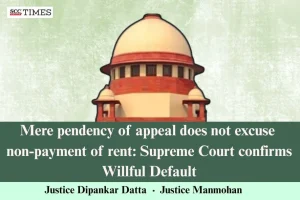Supreme Court: In a case revolving around the question of willful default in payment of rent, the bench of Dipankar Datta* and Manmohan, JJ has held that mere pendency of appeal does not excuse non-payment of rent and that such conduct amounted to willful default.
Factual Background
In the case at hand, the owner of a godown and adjacent buildings in Coimbatore, leased out portions of the property to the lessee under multiple agreements executed between 1999 and 2001. The leased area totalled 15,500 sq. ft., with a combined monthly rent of ₹48,000, although the lessee contended it was only ₹33,000. In 2004, the landlord approached the Rent Controller, Coimbatore, alleging that the original rent was Rs. 48,000/- p.m. and not Rs. 33,000/- as claimed by the lessee; and consequently, fixation of Rs. 3,76,800/- p.m. as fair rent was sought.
On 10-01-2007, the Rent Controller, Coimbatore fixed the fair rent at Rs. 2,43,600/- p.m., payable with effect from 01-02-2005. Despite this order, the lessee continued to pay only the earlier contractual rent at the rate of Rs. 48,000 p.m., leading to an accumulation of arrears from 01-02-2005 to 30-06-2007, amounting to Rs. 68,87,400/-, exclusive of subsequent dues. The lessee, however, neither sought nor obtained a stay of the said order before the appellate or revisional fora.
On 09-09-2011, the High Court modified the fair rent marginally to Rs.2,37,500 p.m. A legal notice dated 01-10-2011 was thereafter issued by the landlord demanding arrears of Rs.1,22,22,000/-, after giving credit for the deposit of Rs.25,00,000/- earlier made under the interim direction of the Madras High Court. However, instead of settling the arrears, the lessee continued making only partial payments, further increasing the arrears.
The lessee made partial payments and only began clearing significant arrears after the Supreme Court’s order dated 23-03-2012, directing the lessee to pay arrears in instalments of Rs.15,00,000/- by the 15th of each month, along with regular rent of Rs.2,37,500/- p.m., clarifying that such arrangement was without prejudice to the rights of the parties in the pending proceedings. However, the landlord continued to assert claims for service tax and interest and eventually filed a suit for eviction.
The Rent Controller dismissed the eviction application in 2019, ruling no willful default. However, the Principal Subordinate Judge overturned this in 2020, finding that the lessee’s delayed payments constituted willful default. The lessee’s revisional application to the High Court was dismissed on 22.06.2021, by holding that the interim direction to deposit Rs.25,00,000/- and to pay Rs.75,000/- p.m. was only for the purpose of admission of the civil revision petition and that the Court had not granted any stay of the order. Although the appellants commenced paying rent as fixed by the High Court from 21.10.2011, belated payment of accumulated arrears nonetheless constituted willful default.
Supreme Court’s Analysis and Ruling
The Supreme Court noted that the lessee challenged the fixation of fair rent but did not seek a stay of its operation before the appellate or revisional fora, and hence, held that mere filing of an appeal does not operate as a stay of the decree/order under appeal is the statutory ordainment in sub-rule (1) of Rule 5 of Order XLI, CPC.
The Court noted that in the case at hand, the payments were made belatedly and only after protracted litigation and that such conduct cannot be reconciled with bona fide doubt as to liability. It was observed that the plea that pendency of proceedings created uncertainty as to the quantum payable is of no avail to the appellants. Therefore, the Court concluded that the lessee’s conduct, including the continued non-payment of rent despite judicial determinations, amounted to willful default.
On lessee’s contention that eviction proceedings should not be allowed due to the absence of a two-month notice under Section 10(2)(i) of the Rent Control Act, 1960, the Court clarified that the statute, when read as a whole, does not render such notice an indispensable condition precedent to the assumption of jurisdiction by the Rent Controller. The Court explained that the Explanation merely provides an additional instance where, upon service of notice and continued non-payment, the default may be presumed to be willful; it does not, by necessary implication, obliterate the discretion vested in the Controller under the proviso to determine willfulness even in the absence of such notice.
The Court was also not impressed by lessee’s reliance on the principle of judicial finality, and held that the principle of finality of a judicial decision would have no applicability in a situation where a party, despite owing money (unpaid rent, here) to his adversary in terms of a judicial determination, approaches the superior forum but prefers not to seek a stay of such determination pending the proceedings leaving the other party deprived of the benefits flowing from the said judicial determination.
“The bogey of judicial finality cannot, thus, be pressed into service to unfairly deny a party the benefits of a judicial decision, operation of which does not suffer from any interdiction by the superior court.”
The Court, hence, concluded that the High Court committed no error in affirming the appellate order of eviction passed against the appellants on the ground of willful default.
[K. Subramaniam v. Krishna Mills (P) Ltd., 2025 SCC OnLine SC 2383, decided on 11.11.2025]
*Judgment authored by Justice Dipankar Datta
Advocates who appeared in this case :
For Appellant(s): Mr. Jaideep Gupta, Sr. Adv., Mr. Senthil Jagadeesan, Sr. Adv., Mr. Sajal Jain, AOR, Mr. Punit Agarwwal, Adv., Mr. Riddhi Bose, Adv., Ms. Racheeta Chawla, Adv., Ms. Rishi Agarwal, Adv., Ms. Sampriti Baksi, Adv., For Appellant(s)
For Respondent(s): Mrs. V Mohana, Sr. Adv., Mr. B Ragunath, Adv., Mrs. Nc Kavitha, Adv., Mr. Sriram P., AOR

